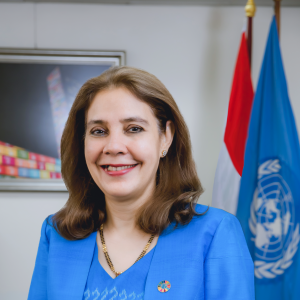Your Excellencies, it is an honour to speak to Indonesia’s commitment to make its food systems climate-resilient while reducing emissions.
Indonesia is the world’s largest archipelago, with an impressive development trajectory with 62% of SDGs on track.
Agriculture accounts for nearly 14% of GDP and is an economic driver, especially in less urbanized areas.
The President prioritizes food security and enhancing food productivity by balancing sustainability with growth.
The government is also committed to reducing 8% of emissions coming from agriculture. Importantly, it has a clarity of vision on NDC-related actions to meet the countries net-zero agenda.
These include improving resource efficiency, scaling up organic fertilizers, food diversification, tackling water scarcity and scaling up renewables.
Let me speak to 3 convergence priorities for Government and UN partnership.
One, Indonesia is committed to transforming food availability, productivity, and sustainability. However, there is no one-size-fits-all solution. A diversity of climate-resilient food strategies are needed to align with regional conditions.
In Sulawesi and Maluku, for instance, the priority is to scale up blue-foods such as shrimp and seaweed farming. While, in Sumatra the focus is on improving food quality, including organic farming.
The UN’s partnership led by FAO and IFAD is premised on these national pathways to protect natural resources and maintain biodiversity.
Two, in preparation for COP30 the UN is partnering with government to build the evidence base for food transformation.
We will analyse one key crop, such as rice, to better understand the emissions generated throughout its lifecycle with carbon footprints measured at each step.
This will enable cutting back on emissions while lowering food waste, which constitutes a third of all food produced being lost or wasted.
The will inform policies from production to consumption.
The government is also committed to diversifying food systems with a focus on traditional and nutritious crops such as soybean, cassava, sago, and breadfruit.
This is aligned to its forward-looking nutritious meal programme to tackle malnutrition by reaching 80 million infants, children and mothers.
A whole-of-UN approach is focused on facilitating this by analysing supply chains, food safety, food diversity, food waste and bio-fortification.
Three, FAO is working with the government on innovative practices to optimize seed and fertilizer use while promoting conservation agriculture.
These practices can increase grain yields, reduce fertilizer and lower pesticide application up to 30%.
This is important as most Indonesian farmers are over 40 with many lacking access to smart-farming practices.
The government and UN are committed to optimising the national scout movement to bring digital solutions and spread best practices for nutrition and food waste reduction.
Looking ahead, scaling up sustainable agriculture and blue foods will be key to Indonesia’s target of an annual 8% growth in GDP to break out of the middle-income trap.
As RC, my role focuses on coordination, convening and leading to accelerate climate-resilient food systems.
I leverage cutting-edge technical assistance, science-backed solutions and best available green technologies that the UN country team brings to bear for advancing national priorities aligned to SDGs.
Coordinating a whole-of-UN approach is targeted at reducing emissions, scaling up agricultural productivity and diversifying food systems.
In partnership with government, as the RC I also convene stakeholders, including the private and financial institutions, to raise ambition on climate action and bridge the $522 billion need to meet the NDCs.
This has translated into mobilizing $10 billion through sovereign and corporate bonds for climate, ESG investments through national banks and Islamic financing for water at subnational levels.
RC’s lead premised on clarity of vision and purpose to add strategic value to nationally prioritized initiatives specifically in an upper middle-income context like Indonesia.
In the run-up to COP30, the partnership with government will focus on assessing carbon footprint for agricultural crops and scaling up innovative financing in support of food systems.
Another priority is to engage young people in support of smart agriculture to enhance efficiency, reduce resource use and scale up waste management.
REFLECTION
It will be critical for all stakeholders – government, UN, PS and civil society – to come together strategically to leverage these global platforms backed by TA brought to bear by food systems hub and SUN to advance nutritious meals which is closely aligned to climate resilient food systems.
It is also critical to get young people involved in this dialogue which is imperative for countries like Indonesia wherein 48% of the population is below 30 years while mainstreaming blue foods into the food system dialogue as well.






